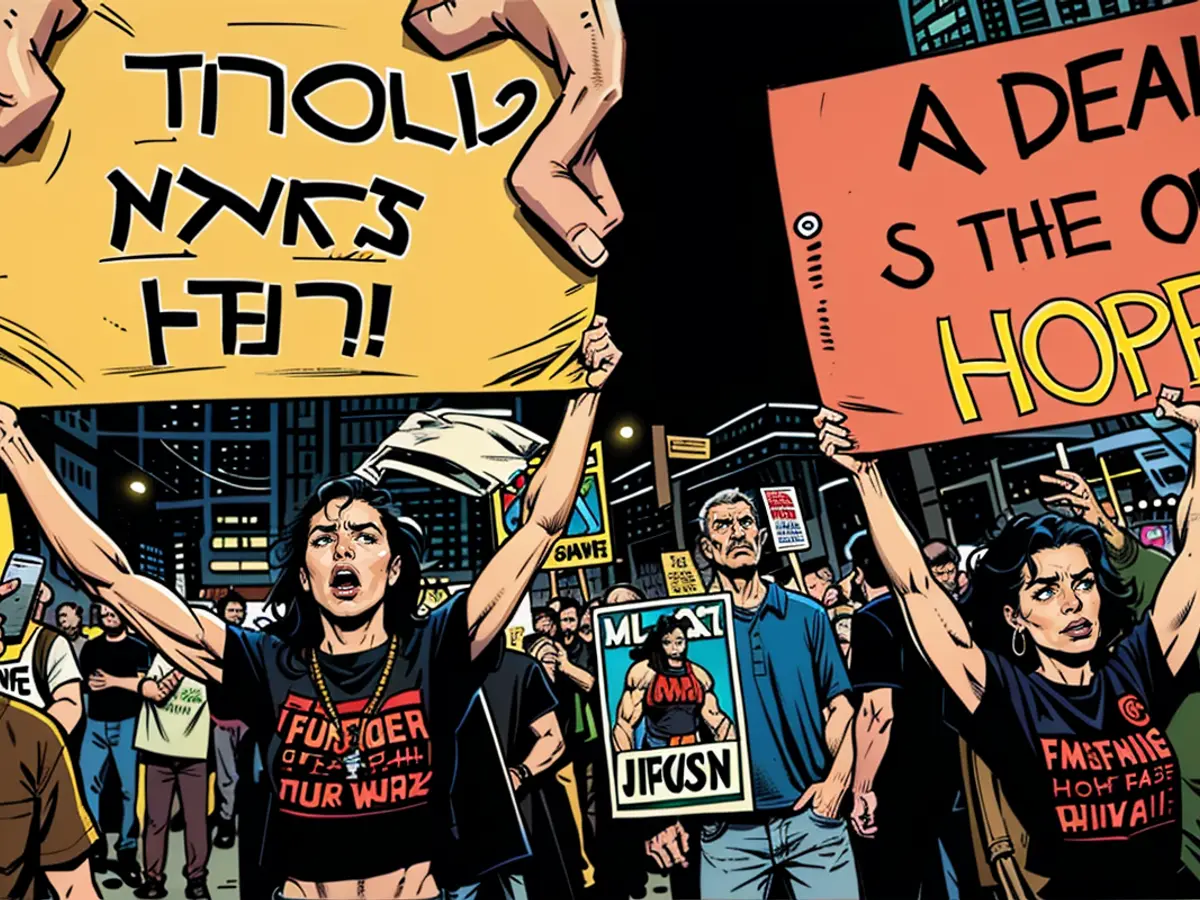- Recent public demonstrations erupt in Israel, advocating for an accord regarding Gaza.
Amid some optimism for a settlement in talks over a truce in the Gaza conflict, numerous individuals rallied in Israel, pushing for an accord. The individuals imprisoned by Hamas in Gaza, despite over ten months of conflict, are reportedly running out of time, leading to the belief that an agreement must be reached immediately, as stated by a brother of a captive in "Times of Israel".
The demonstrators again expressed their desire for Prime Minister Benjamin Netanyahu's resignation and new elections. They accuse Netanyahu of derailing a deal and succumbing to the demands of his right-wing coalition partners.
Negotiators are expected to continue discussions in Cairo, Egypt today, addressing the remaining issues. The USA, Qatar, and Egypt are mediating in the indirect negotiations between Israel and Hamas. Additionally, US Secretary of State Antony Blinken is scheduled to meet with Israel's political leadership today to encourage an agreement.
Control over the Gaza border with Egypt remains a contentious issue. Israel's demand for permanent control of the border between the Gaza Strip and Egypt is reportedly one of the final obstacles to an agreement. This demand was excluded from the initial proposal to bridge the remaining issues, according to Channel 12. Hamas accuses Israel of hindering negotiations by refusing to withdraw from the Philadelphi Corridor, along the southern border of Gaza. Hamas demands a complete Israeli withdrawal.
Prime Minister Netanyahu insists that the Israeli army should continue controlling the Philadelphi Corridor following a ceasefire, to prevent weapons smuggling. Another point of contention is the issue of the return of residents who fled to the southern Gaza Strip to the northern sealed coastal region. Netanyahu demands that an agreement prevent the return of armed Hamas fighters to the north. If Israel does not show flexibility in these issues, there's no room for optimism, according to Channel 12.
Israel's Chief of Staff Herzi Halevi recently stated that the army could maintain control of the Philadelphi Corridor without constant presence and occasional incursions. Following the latest round of talks in Doha, Israel's negotiating team expressed cautious optimism about a ceasefire. A deal based on the updated US proposal contains "acceptable components for Israel," according to Netanyahu's office. Another high-level meeting is scheduled to take place in Cairo by the end of next week, with negotiators set to discuss remaining issues.
There are warnings of potential escalation. Foreign Minister Annalena Baerbock (Greens) and her counterparts from France, Britain, and Italy urged all parties to engage positively and flexibly in the process. They emphasized the importance of avoiding measures that could lead to escalation and jeopardize the chance of peace.
Egypt's President Abdel Fattah al-Sisi stated that the war in the Gaza Strip could plunge the entire region into "an unrelenting cycle of instability". Therefore, it's crucial to utilize the ongoing negotiations to end the war. An agreement would prevent further bloodshed and protect the region from the consequences of further escalation.
Iran and the Hezbollah militia in Lebanon have threatened revenge following the killing of Hamas' foreign chief Ismail Haniyah in Tehran and a Hezbollah military commander over two weeks ago. An attack has been expected since then. Both entities are affiliated with Hamas and may refrain from a larger, possibly coordinated attack against Israel in the event of a ceasefire in Gaza.
Relatives of the hostages are demanding a deal. A Hamas representative, who did not participate in the Doha talks, remained reserved about the talks' outcome. US President Joe Biden presented a proposal to end the war in three phases in May. It calls for an unlimited six-week ceasefire, followed by hostage releases, a permanent end to fighting, and Gaza's reconstruction in the final phase.
Hamas continues to hold 115 hostages, according to Israeli records, of whom 41 have been declared dead by Israel. Additionally, other hostages may not be alive. During the latest nationwide mass protests in Israel, a hostage's father told the Israeli newspaper "Haaretz": "Even if this is not a perfect deal, it's the only deal there is."
The conflict in Gaza originated from a terrorist attack by Hamas and other extremists from Gaza on southern Israel on October 7, resulting in over 1200 deaths and 250 kidnappings. In the blockaded coastal region, around 40,000 people have reportedly died due to the war, according to figures from the Hamas-controlled health authority.
The international community is closely monitoring the ongoing negotiations, with US Secretary of State Antony Blinken planning to meet with Israeli leaders in Qatar. Despite progress in the talks in Doha, the situation in Doha remains tense, as relatives of the hostages passionately hope for a resolution in Doha, where Hamas continues to hold numerous captives.








